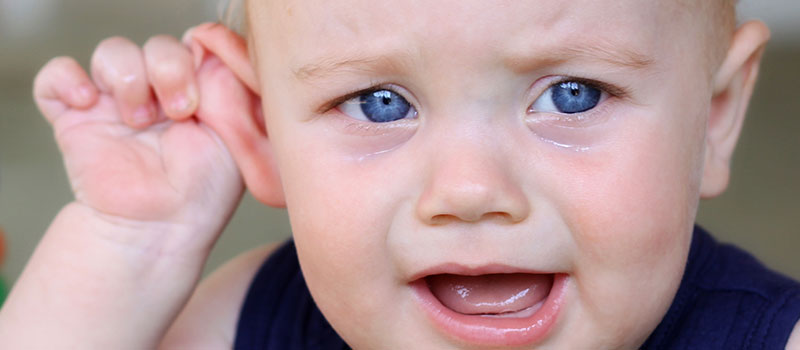According to the National Institute of Health, five in six children will have at least one ear infection by their third birthday. They’re painful, they’re stubborn and they can be tough for a young child to cope with. If your child is suffering, there are a few things you can do to help ease their discomfort.
Why Do Children Get Ear Infections?
If you could peak inside your child’s head, you would see thin tubes that connect their ears to the back of their throat. These are the Eustachian tubes, the ear’s air pressure regulators and drainage system. In adults, they’re long and slanted for efficient drainage. In children, the tubes are short and horizontal. The ear can’t drain as effectively, and it’s easy for bacteria from the throat and nasal tract to travel into the ear.
Once bacteria is in the ears, the inside of the ears gets inflamed. The opening to your child’s tiny Eustachian tubes get swollen shut. A vacuum is formed by the natural pressure in your child’s ears. Normally, the pressure is relieved when we chew and swallow, which encourages the Eustachian tubes to open. When they’re swollen shut, the pressure builds. Fluid is pulled out of the surrounding tissues.
The fluid becomes a breeding ground for bacteria, and the next thing you know, your child is experiencing the classic symptoms.
What are the Symptoms?
The pressure from lack of air flow and general swelling from infections can be very uncomfortable. Your child doesn’t need to have suffered a recent cold, though colds, flus and allergies can contribute to the frequency of infections. Children with Down Syndrome and other congenital issues with how their internal structures are formed may also be more prone to infections.
Common symptoms of infection include:
- Sensations of pain and pressure in the ear
- Loss of appetite
- Sleeplessness
- Sudden balance problems
- Difficulty hearing, often evidenced by asking you to repeat things or failure to respond to soft sounds
- Discharge from the ear, a sign of possible eardrum rupture
- Fever
- Poking at the ear and head shaking
- Fussing and crying
- Wanting to be held more often
What to Do At Home
Lying down can increase the sensation of pressure and discomfort in your child’s ears. Children over the age of two can be encouraged to sleep propped up with pillows. With younger infants, you can give their crib mattress a slight incline by placing a thin pillow or two beneath the mattress itself.
Warm compresses can provide some temporary pain relief. Moist heat is preferable, so use a clean washcloth dipped in warm water or a microwavable hot pack designed to be misted with water. Being mindful of the temperature, apply the compress over the ear for 10 to 15 minutes. This can be especially helpful at bedtime.
Swallowing encourages the Eustachian tubes to open and relieve the painful pressure. Give your child plenty of fluids. Gum and hard candy can be given to children old enough to have them safety, at least 4 years of age.
What to Expect from Your Doctor
Most children will recover from an ear infection in about three days. While it used to be common practice to prescribe antibiotics, unnecessary use of antibiotics increases the risk that the infection-causing bacteria will develop a resistance to medications. Future infections can become harder to treat.
Doctors today tend to reserve antibiotics for:
- Children under six months of age
- Severe cases, such as ruptured eardrums
- Infections lasting longer than 72 hours
- Children at risk for serious infection or complications
Unless your child already had a cold or flu, cold and flu medications are unlikely to help. Your doctor may recommend a mild anti-inflammatory, like ibuprofen, for children over six months old.
Your doctor may recommend you postpone any planned airplane trips until the infection clears up. Changes in cabin pressure can exacerbate symptoms and risk eardrum perforation.
My Child Gets A Lot of Infections. Should I Be Worried?
Most children outgrow these infections as their Eustachian tubes get longer and tilt for better drainage. However, if your child has severe or chronic infections, it may be time to consult an ear-nose-and-throat doctor. In the short term, chronic infection can interfere with learning and the development of language skills. In the long term, hearing can be damaged, and your child can fall behind in learning, social skills and emotional development.
Early treatment plays an important role in monitoring your child’s progress and protecting their health. If your child suffers from frequent ear infections, call Pediatric ENT of Oklahoma and schedule an appointment with one of our specialists today.

